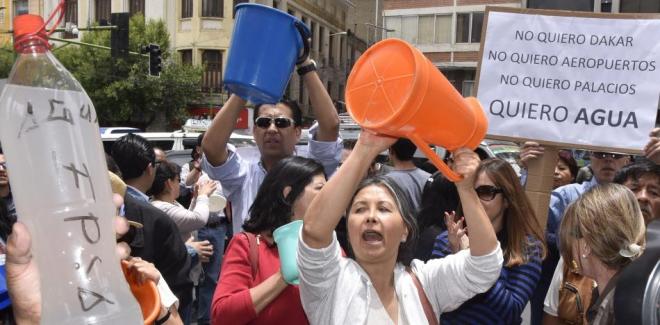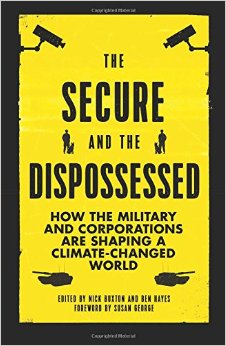Earth Democracy
Published on December, 45 2016
Bolivians protest against water scarcity severely affecting the South American country. La Paz, Bolivia, November 18, 2016. Credit: hispantv.com.
By Nancy Price, Earth Democracy
What is our moral obligation? The three main dams supplying water to Bolivia’s largest cities—La Paz and El Alto—are no longer fed by Andean glaciers, which have provided up to 28 percent of city water. Demand now outstrips supply.
This Bolivian crisis as reported in recent articles makes clear how heartbreaking this crisis is for Bolivians and Mother Earth—articles such as: “Bolivian Water Crisis as Glaciers Vanish”; “Bolivia’s Severe Water Shortage Triggers National Emergency”; and “Bolivian President Orders Army to Tackle the Water Scarcity in La Paz.” As recently as November 23, thousands marched in La Paz, demanding a few liters of water. Now it is reported that some are fleeing to Peru in search of water, yet Peru also depends on glacial water sources that are disappearing.
Will the Bolivian government or the Andean states remain stable in the face of this crisis? Let’s remember that the 2006 drought in Syria, which drove devastated famers into urban areas that the state was unprepared to assist, is cited as one of a complex of causes that led to civil unrest and, ultimately, the war.
As citizens of the country with the second highest carbon footprint, behind China, what is our moral obligation to people in countries that are far less able to meet the climate crisis and deal with water shortages? What is our moral obligation to all people, exemplified by those now at Standing Rock, who risk their lives to keep fossil fuels in the ground to lessen global warming, to stop the overuse and pollution of critical fresh water supplies, and to support an emergency transition to a clean, renewable, and sustainable energy economy?
 In the book he co-edited, “The Secure and the Dispossessed: How the Military and Corporations Are Shaping a Climate-Changed World,” Nick Buxton presents his research and analysis on the preparations that the Pentagon and transnational corporations are making to militarize security responses to the unfolding climate crisis. He explores how the climate security agenda is playing out in the arenas of food, water, and energy. The implications for social and environmental justice are potentially very disturbing, as authoritarian solutions are increasingly recommended, such as guarding against climate change refugees rather than providing support. At the same time, Buxton discusses alternatives undertaken by people to cooperatively adapt and build a just response to the climate crisis. Here’s a short video of Nick speaking about his book.
In the book he co-edited, “The Secure and the Dispossessed: How the Military and Corporations Are Shaping a Climate-Changed World,” Nick Buxton presents his research and analysis on the preparations that the Pentagon and transnational corporations are making to militarize security responses to the unfolding climate crisis. He explores how the climate security agenda is playing out in the arenas of food, water, and energy. The implications for social and environmental justice are potentially very disturbing, as authoritarian solutions are increasingly recommended, such as guarding against climate change refugees rather than providing support. At the same time, Buxton discusses alternatives undertaken by people to cooperatively adapt and build a just response to the climate crisis. Here’s a short video of Nick speaking about his book.
Clearly, the military and allied corporations stand to profit from climate conflicts, migrations, climate disasters, and much more. We only have to look at Syria and Standing Rock to understand what Buxton is predicting if we don’t take action and respond compassionately in this time of global crisis. You’ll have to read this compelling book—a perfect opportunity for a Branch reading and discussion project—to grasp the full scope of his argument and his suggestions for action.
Here are actions to take now:
Even though the DAPL easement to build the pipeline across tribal land and under the Missouri River has been denied, the fight is not over! In the days and weeks ahead, here are the 10 questions we need to be asking (scroll to the bottom of that web page for the questions).
- The tribes will remain at Standing Rock for whatever future actions are needed. Please join the #NoDAPL December Global Month of Action. Thanks to the many WILPFers who have donated already or have gone to Standing Rock.
- Use Nick Buxton’s book for a Branch discussion.
Most recently, the Take Action Took Kit, which the Corporations v Democracy and Earth Democracy Issue Committees have prepared, was posted to the WILPF US website. Marybeth Gardam and I hope you find this a useful resource.



